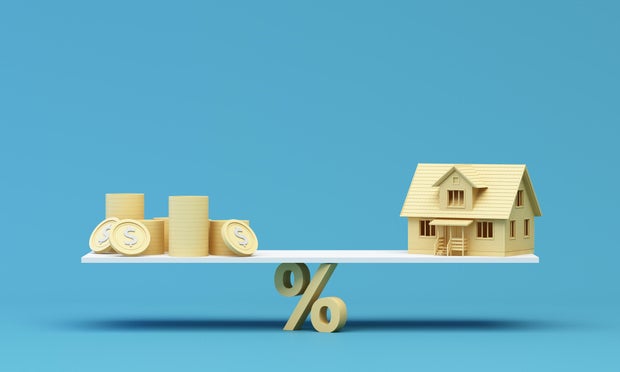 There are a few things worth considering if you're planning to refinance your mortgage loan soon.
Getty Images/iStockphoto
There are a few things worth considering if you're planning to refinance your mortgage loan soon.
Getty Images/iStockphoto
The interest rate climate has already begun to shift ahead of the Federal Reserve's expected rate cuts this month. Just this week, mortgage rates dropped substantially, falling to an average of 6.35%, according to Freddie Mac. That's the lowest average mortgage rate we've seen since October 2024. And, mortgage refinance rates are currently sitting at an average of 6.72% for 30-year loan terms.
The dip spurred some homeowners to refinance their mortgage loans. In fact, mortgage loan refinances accounted for nearly 47% of all mortgage applications in the week ending September 3. "We've seen increased demand for refinance as homeowners look to take advantage of lowering rates or opportunities to tap into the home equity they've built," says Bhavesh Patel, consumer channel executive at Chase Home Lending.
That, in turn, begs the question: Is refinancing something you should consider right now? Or could waiting a little longer offer better results?
Compare your top mortgage loan options and find the right fit now.
What to consider about mortgage refinancing now
Here's what experts say to consider if you're thinking about refinancing your mortgage loan now:
Your current rate
"Roughly 3 million homeowners could potentially come into money through a refinance at today's interest rates," Patel says.
Today's 30-year mortgage refinance rates are averaging about 6.7%, and the average 15-year refinancing rate is significantly lower at 6%. So, if you have a mortgage loan with a higher rate, or if you can afford the higher monthly payments that come with a shorter loan term, it could make sense to start thinking about refinancing.
"Anyone with a rate over 7% should start preparing to refinance," says Debra Shultz, vice president of lending at CrossCountry Mortgage. "Start talking to your loan officer now. They can set a rate alert in their pricing engine to fire when rates hit the target that makes the most sense for your loan."
You can use a loan calculator to determine what rates would be worth refinancing your loan for.
Learn how affordable the right mortgage loan could be now.
Your financial needs
Inflation has risen steadily over the last few months, taking prices up with it. If you're struggling to keep up with those costs, refinancing might be the smart move.
"If cash flow and lowering your monthly payment are the priority, refinance as soon as the payment drop makes a nice impact on your finances," Shultz says. "And keep in mind, you can always refinance again in the future if rates fall enough to make it worth your while.
If rates aren't notably lower than your current rate, you may still be able to lower your payment by refinancing into a longer-term loan, which spreads your balance out over more payments, or with an adjustable-rate mortgage (ARM) loan. ARM loans tend to have lower-than-average rates for the first few years of the loan term. For example, today's average 3/1 ARM refinance loan comes with a rate of 6%, which is lower than you would get with a 30-year conventional loan.
"It's a good time to refinance if you need some pressure relief," says Chris Parks, sales manager at Churchill Mortgage.
Refinancing may also be a good move if you're dealing with high amounts of credit card debt. Right now, the average credit card rate is over 21%, while mortgage rates are significantly lower. So, if you were to use the funds from a cash-out refinance to pay off credit cards, you're essentially trading in your double-digit credit card rate for a significantly lower rate.
"Consumer credit card debt is at an all-time high, while simultaneously, we have seen a historic rise in home values," says Darren Tooley, team sales manager at Union Home Mortgage. "Millions of homeowners could use the equity in their homes to pay off high-interest debt while lowering overall household expenses by hundreds or, sometimes, even thousands of dollars per month."
The potential benefits and risks
Mortgage rates could keep declining, so if you can afford to wait it out a few months, you may be able to get a lower rate by refinancing later this year.
"I expect us to see the high 5% range by year-end," Shultz says. "There have been a lot of false starts over the past three years, but the Fed is much more on board with rate cuts now."
Just be warned that there is some risk to waiting. Market conditions could shift over time, after all.
"Suppose you could lower your interest rate by 1% today versus waiting until December and possibly dropping 1.2%," Tooley says. "In that case, I think a lot of people would say that they would wait. Still, they forgot to factor in that they are paying a complete 1% higher than they could be for a four- or five-month period, and it will take a year or more for that extra 0.2% savings to equal the additional interest they spent while waiting."
There's also an opportunity cost to waiting.
"We all want the lowest rates possible, but homeowners need to realize every month they keep their higher-rate mortgage or higher-rate credit cards, there is an actual cost to waiting that needs to be factored in," Tooley says. "Often, the cost of waiting is more than the savings, even if rates continue to go down in the future."
The timing
There's no such thing as perfect timing when it comes to refinancing. The right time is when the numbers work in your favor and the refinance can help you achieve a financial goal, experts say.
"It's always a great time to refinance, as long as there is a benefit to do so," Tooley says. "Trying to time buying a home or refinancing to the exact moment rates are the lowest is a fool's mission and will often cost you more than it saves."
If you're not sure it's the right time for you to refinance, talk to a loan officer or mortgage broker. They can break down the numbers and help you find the right direction to take.
The bottom line
Refinancing in today's shifting market comes down to more than just chasing the lowest rate. It's about aligning the move with your financial goals. Whether that's freeing up cash flow, wiping out costly credit card debt or simply lowering your monthly mortgage bill, running the numbers with a loan officer can help you make the right call. While rates may fall further, waiting can also mean leaving real savings on the table each month. If refinancing can ease your financial strain or put you ahead in the long run, it may be worth acting sooner rather than later.
Aly J. Yale is a contributing writer for the Managing Your Money section for CBSNews.com, covering various personal finance topics, including investing, homebuying, loans and more.


















































